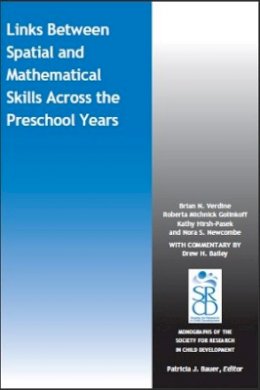
Link Between Spatial and Mathematical Skills Across the Preschool Years
Brian N. Verdine
Understanding the development of spatial skills is important for improving overall success in STEM (science, technology, engineering, and mathematics) fields (e.g., Wai, Lubinski, Benbow, & Steiger, 2010). Children use spatial skills to understand the world and can practice them via spatial assembly activities like puzzles or blocks. These skills have been linked to success in subjects like mathematics (Mix & Cheng, 2012) and science (Pallrand & Seeber, 1984; Pribyl & Bodner, 1987). This monograph sought to answer four questions about early spatial development: 1) Can we reliably measure spatial skills in 3- and 4-year-olds?; 2) Do spatial skills measured at 3 predict spatial skills at age 5?; 3) Do preschool spatial skills predict mathematics skills at age 5?; and 4) What factors contribute to individual differences in preschool spatial skills (e.g., SES, gender, fine-motor skills, vocabulary, and executive function)? Longitudinal data generated from a new spatial skill test for 3-year-old children, called the TOSA (Test of Spatial Assembly), show that it is a reliable and valid measure of early spatial skills that provides strong prediction to spatial skills measured with established tests at age 5. New data using this measure finds links between early spatial skill and mathematics, language, and executive function skills. Analyses suggest that preschool spatial experiences may play a central role in early mathematical skills. Executive function skills further predict mathematical performance and individual differences, specifically socio economic status, are related to spatial and mathematical skill. We conclude by exploring ways of providing rich early spatial experiences.
Product Details
About Brian N. Verdine
Reviews for Link Between Spatial and Mathematical Skills Across the Preschool Years
